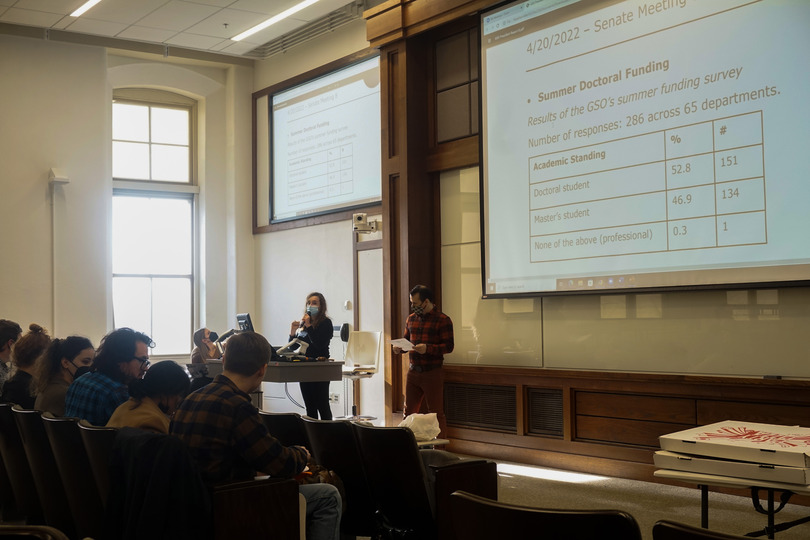GSO advocates for more graduate student funding, proposes new executive board position

Leanne Rivera | Staff Photographer
During the meeting, GSO Vice President for Internal Affairs Daniel Kimmel proposed a constitutional amendment to create a new communication secretary executive position.
Get the latest Syracuse news delivered right to your inbox.
Subscribe to our newsletter here.
During the Graduate Student Organization Senate meeting Wednesday, GSO President Yousr Dhaouadi revealed the results of a survey conducted by the organization on funding for graduate students at Syracuse University.
The survey, conducted among 286 respondents across 65 departments, revealed that the average monthly salary for graduate students at SU during the semesters is below $2,000.
The same survey revealed that approximately one-third of 151 doctoral student respondents, excluding first-year students, answered “no” to ever receiving summer funding.
Dhaouadi referenced the average housing cost from SU’s cost of attendance website, which is valued about $1,160 per month. She also said the average cost of living without rent for a single person is just above $900 per month. The two combined exceed the average salary SU graduate students are getting, Dhaoudi said.
“So if you add that together, what students are reporting to be getting per month over the year is short of what the school and the city tells you you need per month to survive as a human,” Dhaouadi said.
Dhaouadi said during the meeting that she will file a report based on the survey responses to the Board of Trustees next week.
During the meeting, GSO Vice President for Internal Affairs Daniel Kimmel proposed a constitutional amendment to create a new communication secretary executive position. The organization currently has two secretarial positions that assist the internal and financial operations, respectively.
Kimmel wrote in the proposal that the workload upon the recording secretary is too great and exceeds the intent of this position. Simply increasing pay, they said, would not solve the issue.
The proposed new position will be responsible for assisting the external vice president on recruiting senators from academic programs lacking GSO Senate representation. The role will also aid in increasing the organization’s visibility, putting together organizational events and managing advertising, according to the proposed resolution.
Additionally, the position will be responsible for maintaining and updating the organization’s public documents, forms and website. The communications secretary will also be able to serve in the University Senate when one of the organization’s seats is not filled. GSO will vote on the resolution in their next meeting on May 4.
The meeting also passed a resolution that was introduced on March 23, which would increase the number of at-large senate seats from six to 10. Any GSO members may fill these seats without restriction, the resolution reads. Five of the seats would be elected in the annual elections special meeting and the other five will be filled at the first meeting of the fall semester.





